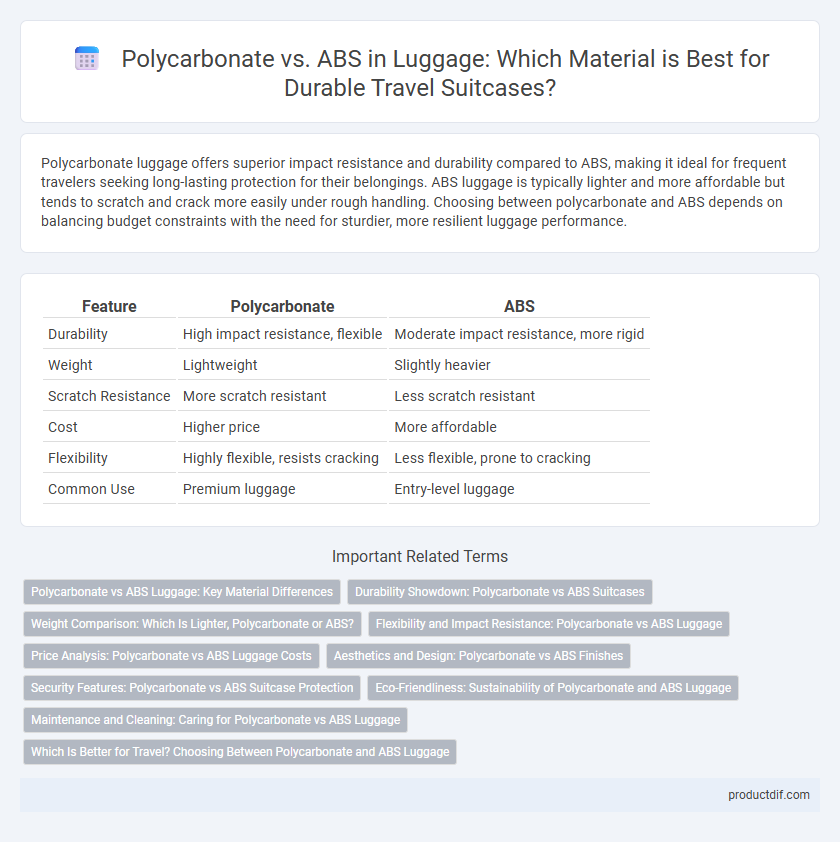Polycarbonate luggage offers superior impact resistance and durability compared to ABS, making it ideal for frequent travelers seeking long-lasting protection for their belongings. ABS luggage is typically lighter and more affordable but tends to scratch and crack more easily under rough handling. Choosing between polycarbonate and ABS depends on balancing budget constraints with the need for sturdier, more resilient luggage performance.
Table of Comparison
| Feature | Polycarbonate | ABS |
|---|---|---|
| Durability | High impact resistance, flexible | Moderate impact resistance, more rigid |
| Weight | Lightweight | Slightly heavier |
| Scratch Resistance | More scratch resistant | Less scratch resistant |
| Cost | Higher price | More affordable |
| Flexibility | Highly flexible, resists cracking | Less flexible, prone to cracking |
| Common Use | Premium luggage | Entry-level luggage |
Polycarbonate vs ABS Luggage: Key Material Differences
Polycarbonate luggage offers superior impact resistance and flexibility, making it less prone to cracking compared to ABS, which is harder but more brittle. Polycarbonate's lightweight nature improves portability without sacrificing durability, while ABS luggage tends to be more affordable but may show wear faster. The enhanced resilience of polycarbonate makes it the preferred choice for frequent travelers seeking long-lasting, protective luggage solutions.
Durability Showdown: Polycarbonate vs ABS Suitcases
Polycarbonate suitcases offer superior impact resistance and flexibility, allowing them to absorb shocks without cracking, making them ideal for frequent travelers seeking durability. ABS luggage is generally lighter and more affordable but tends to be less resistant to heavy impacts, which can lead to cracks or dents over time. When comparing durability, polycarbonate outperforms ABS in withstanding rough handling and maintaining structural integrity during extended use.
Weight Comparison: Which Is Lighter, Polycarbonate or ABS?
Polycarbonate luggage typically weighs less than ABS due to its lightweight molecular structure and higher strength-to-weight ratio, making it ideal for travelers seeking durable yet light suitcases. ABS luggage, while generally heavier, offers good impact resistance and tends to be more affordable, but its increased weight may affect airline baggage weight limits. Choosing polycarbonate can lead to easier maneuverability and reduced overall travel burden compared to ABS.
Flexibility and Impact Resistance: Polycarbonate vs ABS Luggage
Polycarbonate luggage offers superior flexibility and impact resistance due to its ability to absorb shocks and return to its original shape, making it highly durable for rough handling. ABS luggage, while more affordable, tends to be more rigid and prone to cracking under heavy impact, offering less flexibility. Travelers seeking long-lasting and resilient luggage often prefer polycarbonate for enhanced protection of their belongings.
Price Analysis: Polycarbonate vs ABS Luggage Costs
Polycarbonate luggage generally commands a higher price point due to its superior durability, impact resistance, and lightweight properties compared to ABS. ABS luggage is more budget-friendly, making it a popular choice for cost-conscious travelers, though it may sacrifice some strength and longevity. Investing in polycarbonate often results in better long-term value despite the initial higher cost.
Aesthetics and Design: Polycarbonate vs ABS Finishes
Polycarbonate luggage offers a sleek, glossy finish that resists scratches and maintains its vibrant color over time, enhancing its modern aesthetic appeal. ABS luggage features a matte or semi-gloss finish, often resulting in a more subdued look that can show wear more quickly. The choice between polycarbonate and ABS significantly impacts luggage design, with polycarbonate favored for its high-end, polished appearance and ABS chosen for budget-friendly options with diverse texture possibilities.
Security Features: Polycarbonate vs ABS Suitcase Protection
Polycarbonate suitcases offer superior impact resistance and flexibility, making them less prone to cracking under force compared to ABS luggage. ABS cases typically provide basic security features but are more susceptible to damage, potentially compromising the suitcase's integrity and protection of contents. The enhanced durability of polycarbonate helps maintain secure locking mechanisms and overall suitcase strength, ensuring better protection against tampering or rough handling.
Eco-Friendliness: Sustainability of Polycarbonate and ABS Luggage
Polycarbonate luggage is generally more eco-friendly due to its durability and recyclability, which reduces the frequency of replacements and waste. ABS, while also recyclable, tends to break down faster, leading to shorter product lifespans and increased environmental impact. Choosing polycarbonate over ABS supports sustainability efforts by promoting longer-lasting materials and reducing landfill contributions.
Maintenance and Cleaning: Caring for Polycarbonate vs ABS Luggage
Polycarbonate luggage offers superior durability and scratch resistance, making it easier to maintain with just mild soap and water to keep it looking new. ABS luggage requires more frequent cleaning and gentle handling due to its lower impact resistance and tendency to scuff, usually needing specialized cleaners to avoid surface damage. Both materials benefit from regular wiping and avoiding harsh chemicals, but polycarbonate's resilience makes it more suitable for long-term maintenance with minimal effort.
Which Is Better for Travel? Choosing Between Polycarbonate and ABS Luggage
Polycarbonate luggage offers superior durability and impact resistance, making it ideal for frequent travelers facing rough handling and extreme conditions. ABS luggage, while more affordable and lightweight, is less resilient, best suited for occasional travel or short trips. For long-term investment and maximum protection, polycarbonate stands out as the better choice for travel.
Polycarbonate vs ABS Infographic

 productdif.com
productdif.com